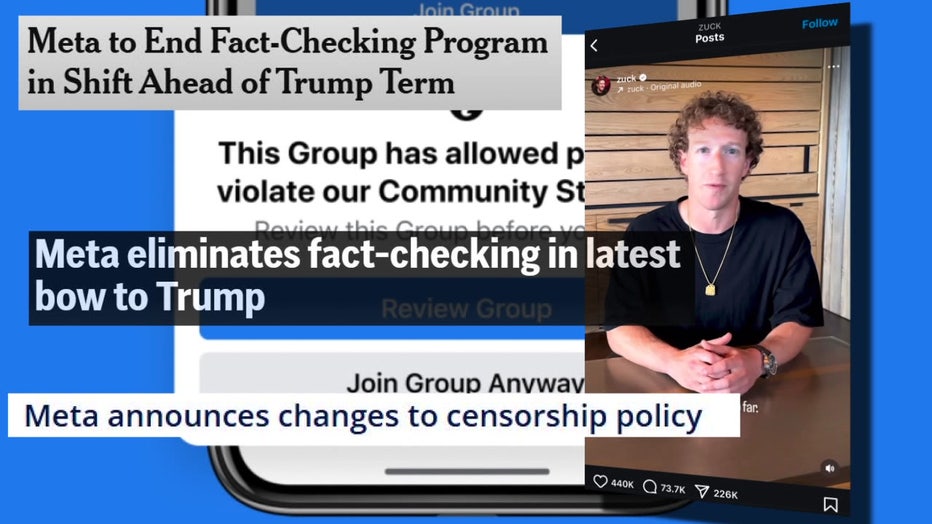WA Sec. of State misinformation team in jeopardy as Meta axes fact-checking
Washington's fight against election misinformation
Making sure elections in Washington are safe and secure — that's Secretary of State Steve Hobbs' job. But with major social media platforms ending fact-checking measures, his office is now facing new problems.
OLYMPIA, Wash. - For Washington Secretary of State Steve Hobbs, safeguarding the integrity of elections is no easy task. Over the past 18 months, his office has identified 127 instances of false or misleading information about elections and election officials circulating online within the state.
However, the task has become even more difficult, as social media giant Meta scales back its fact-checking efforts on platforms like Instagram, Facebook, and WhatsApp.
"There’s just no way that our state alone can correct everything," Hobbs said. "Not when you have all these influencers."
Meta’s recent policy shift means election-related content will no longer undergo third-party fact-checking. Instead, the company will rely on a crowdsourced "Community Notes" system, where users self-report concerning content. This approach mirrors the one adopted by X (formerly Twitter) months ago.
Of the 127 misleading claims identified by Hobbs’ office, 75% originated on X, with just 11% coming from Facebook.

What does it mean if Meta is no longer fact-checking?
What they're saying:
Despite the shift to Community Notes, Hobbs is committed to combating misinformation by spreading the truth rather than targeting the creators of false content.
"The best way to go after these false narratives and doubts about elections is to tell them the truth," Hobbs said. "We’re not going after anybody. We’re not saying, "hey you’re wrong." What we’re doing is we’re saying, "hey have you looked at this information that you’re putting out?"
Hobbs also pointed to the personal toll that misinformation has taken on election officials. He recalled an incident where an influencer falsely claimed that former President Donald Trump had been removed from the ballot in Oregon, resulting in threats made to Oregon’s Secretary of State. Security concerns serious enough authorities temporarily shut down the office.
Hobbs noted that such claims have led to real-world consequences, including threats against officials.
"I've had threats made against myself," he said, adding that election workers in Thurston County also received death threats.
Big picture view:
Hobbs mentioned that his predecessor, Kim Wyman, who left her position to work in the Biden administration, had faced similar dangers.
"When Kim left the office, we talked about misinformation and how, at the time, there wasn't much capability to push back on it," Hobbs said.
According to Hobbs, that conversation inspired the creation of the Information and Security Response Team. A unit within his office dedicated to combating cyber-attacks and misinformation.
"Luckily, the legislature gave us the funding to do that the last 2–3 years, but now that funding is in jeopardy," shared Hobbs.
The team costs the state $3.2 million a year—small change compared to the state’s $70 billion budget.
"It feels like putting out multiple fires," said Hobbs. "It’s so painful because it’s our democracy that’s in jeopardy here. We have adversaries overseas who are trying to tear us apart. This isn’t a Republican or Democrat thing. This is an American thing."
The Source: Information comes from original reporting by FOX 13 Seattle reporter Lauren Donovan.
BEST OF FOX 13 SEATTLE
These 3 WA cities named among fastest growing in US in 2024
This could be Seattle's third-driest January since 1945
Gates Foundation changes name, branding during milestone year
A 3.5 magnitude earthquake strikes near North Bend
Gov. Bob Ferguson issues 3 executive orders after swearing-in
To get the best local news, weather and sports in Seattle for free, sign up for the daily Fox Seattle Newsletter.
Download the free FOX Seattle FOX LOCAL app for mobile in the Apple App Store or Google Play Store for live Seattle news, top stories, weather updates and more local and national coverage, plus 24/7 streaming coverage from across the nation.

